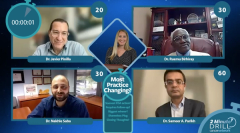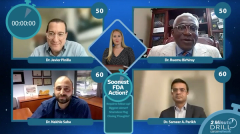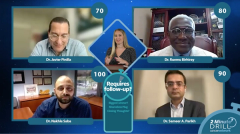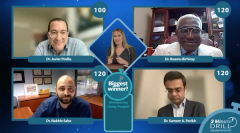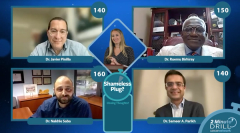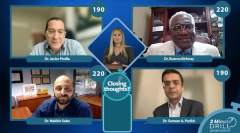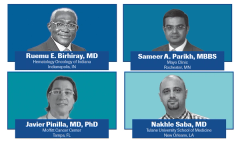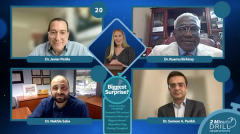
2-Minute Drill: The Biggest Surprise From the 2023 ASCO Annual Meeting
Thought leaders from various institutions offered their take on the biggest surprise that came out of the 2023 ASCO Annual Meeting.
Episodes in this series

Following the 2023 ASCO Annual Meeting, Ruemu E. Birhiray, MD, Hematology Oncology of Indiana; Sameer A. Parikh, MBBS, Mayo Clinic; Javier Pinilla, MD, PhD, Moffitt Cancer Center; and Nakhle Saba, MD, Tulane University School of Medicine, discuss the biggest surprise that they thought came out of the meeting.
The participants had 1 minute each to give their response.
Kahl: First topic, you get 1 minute each to tell us what was the biggest surprise that came out of the ASCO annual meeting? Dr. Pinilla, I’ll start with you.
Pinilla: Great. So as we [are going to] discuss through this presentation, there is not a lot of stuff. But at least something I was really looking forward to really hear [about] was the IVO–ibrutinib [Imbruvica], venetoclax [Venclexta], and obinutuzumab [Gazyva] –vs the obinutuzumab/ibrutinib. So there was [the] ALLIANCE trial that was presented by Jennifer Woyach, [MD], which I think was interesting, because, as [has] happened recently, [the study] I think was done [during] COVID. So COVID has a very, very big influence [on] the outcomes of this trial. And although there was no difference between these 2 arms of the trial, after really taking away the facts of the COVID deaths that happened in both arms, I think they may slightly favored IVO, but it's still the thinnest [difference] out there.
Kahl: Okay, perfect. And under time, so I'm going to give you 20 points there. All right, Dr. Saba?
Saba: Well being focused on lymphoma in my clinic, I would say the LyMa trial update. I was surprised to see that the OS [overall survival] benefit was lost over time. In this trial, about 240 patients with MCL [mantle cell lymphoma] were randomized in a 1:1 fashion to receive maintenance rituximab [Rituxan] for 3 years or observation after autologous stem cell transplantation. At this ASCO, the 7-year update showed that the OS difference: about 83% vs 72%, lost statistical significance compared with the 4-year mark. This still presents great data that is very clinically meaningful. I believe what happened actually with the Triangle study that showed that you could potentially omit transplant altogether if you incorporate bTKI beryllium for anyone in that study with that high-dose, chemotherapy-based induction and rituximab maintenance.
Kahl: Okay, great. And I like the paradigm shift. I’ll go with 30 points there. Dr. Birhiray?
Birhiray: Yes, for me, my friend Alex Herrera, [MD], who presented data [during] the plenary session on Hodgkin's lymphoma. The addition of [nivolumab (Opdivo) to a chemotherapy backbone was superior to brentuximab vedotin [Adcetris] and chemotherapy, that was very significant for a number of reasons. First of all, to think of brentuximab vedotin as a regimen that will result in an overall survival, now being trumped by using a non- chemotherapy agent, nivolumab, that was important. But the most important part of that study, is the fact that that study had minorities represented. About 4% of patients who were there were Black patients, another 13% or so of the patients were Hispanic patients, you know, again, the point that Black people and Hispanic people, when offered clinical trials, will participate. If you bring those trials on board, leave no patient behind. That is my story.
Kahl: Absolutely. It's a very hot topic right now, so 30 points there. And Dr. Parikh, close us out with this question.
Parikh: Yeah, so I'm going to actually go back to the same side as Dr. Pinilla mentioned, which is, at least to me, surprising. We've traditionally thought more is better. And I think in the IVO versus IO study for the elderly patient population in frontline CLL, it appears the triplet combination is no better than the doublet. And I understand, you know, the concerns about COVID-related deaths, etc. But at the end of the day, I think you know, we can have any other infection that comes about in the future. And I think we have to take what the study shows, which is that the triplet does not appear to be any better compared to 2 agents alone. And I think there are a lot of trials looking at this. And to me, it was surprising, because I did think that maybe 3 drugs would be better than 2, but I think we probably reached the limit in older CLL patients in the frontline setting.
Kahl: Absolutely. 20 points there.
Transcription edited for clarity.
Newsletter
Stay up to date on recent advances in the multidisciplinary approach to cancer.


